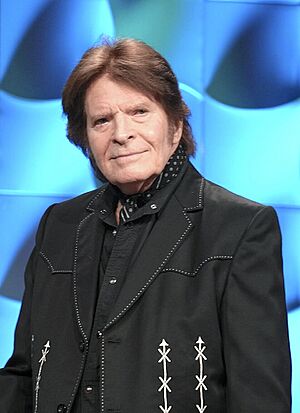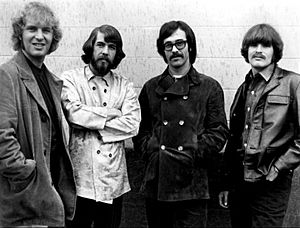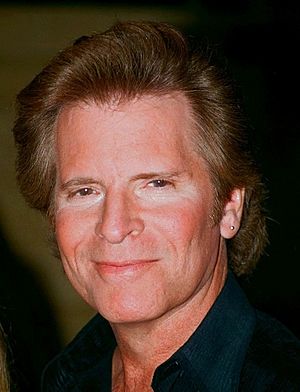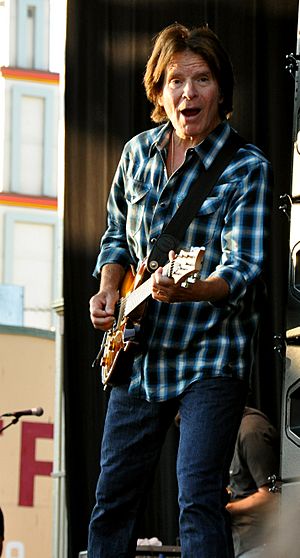John Fogerty facts for kids
Quick facts for kids John Fogerty |
|
|---|---|

Fogerty at SXSW 2025
|
|
| Background information | |
| Birth name | John Cameron Fogerty |
| Born | May 28, 1945 Berkeley, California, U.S. |
| Origin | El Cerrito, California, U.S. |
| Died | Error: Need valid death date (first date): year, month, day |
| Genres |
|
| Occupation(s) |
|
| Instruments |
|
| Years active | 1959–present |
| Labels |
|
John Cameron Fogerty (born May 28, 1945) is an American singer, songwriter, and guitarist. He is famous for being the lead singer, lead guitarist, and main songwriter for the band Creedence Clearwater Revival (CCR). He started CCR with Doug Clifford, Stu Cook, and his brother Tom Fogerty.
CCR was very successful, with many hit songs and albums between 1968 and 1972. The band was honored by being inducted into the Rock and Roll Hall of Fame in 1993.
After CCR broke up in 1972, Fogerty began a successful solo career that continues today. Rolling Stone magazine listed him as one of the 100 Greatest Songwriters and 100 Greatest Singers. Some of his most well-known songs include "Proud Mary", "Bad Moon Rising", "Fortunate Son", "Green River", "Down on the Corner", "Who'll Stop the Rain", "Up Around the Bend", "Have You Ever Seen the Rain", "Centerfield", "The Old Man Down the Road", and "Rockin' All Over the World".
Contents
Early Life and Musical Beginnings
John Fogerty was born in Berkeley, California, on May 28, 1945. He grew up in El Cerrito. He was the third of five sons.
He went to school in Berkeley and later attended El Cerrito High School. There, he met the other future members of CCR. He also took guitar lessons from Barry Olivier, who created the Berkeley Folk Festival. His older brother, Tom, was also a guitarist and played in the same band that would become CCR. John spent summer vacations near Putah Creek, which later inspired the CCR song "Green River".
In 1959, when he was in junior high, Fogerty formed a cover band called the Blue Velvets. He played with bassist Stu Cook and drummer Doug Clifford. They were inspired by early rock and roll artists like Little Richard and Bo Diddley. Later, John's brother Tom joined the group.
In 1964, the band signed with Fantasy Records. Without the band knowing, the record company changed their name to The Golliwogs. This group released seven singles, but they did not become popular.
Military Service During the Vietnam War
In 1966, John Fogerty received a notice for military service during the Vietnam War. He joined the United States Army Reserve as a supply clerk. He completed his six months of active duty service in July 1967. He was later discharged from the Army Reserve in mid-1968.
Creedence Clearwater Revival (1968–1972)

After John Fogerty's Army Reserve service ended, the Golliwogs started playing again. In 1968, they changed their name to Creedence Clearwater Revival. John Fogerty became the lead singer.
The band released their first album, Creedence Clearwater Revival, and had their first hit song, "Susie Q". Many other hit songs and albums followed, including "Proud Mary" and the album Bayou Country.
As the main songwriter, lead singer, and lead guitarist, Fogerty felt his musical ideas should be followed. This led to some disagreements within the band. Tom Fogerty left the group in January 1971. The other two members, Stu Cook and Doug Clifford, wanted to have more say in the band's music. To try and keep the band together, John insisted that Cook and Clifford share songwriting and singing on their final album, Mardi Gras. This album was released in April 1972 and included their last two singles, "Sweet Hitch-Hiker" and "Someday Never Comes". The album sold well, but the band broke up soon after its release.
The four original members only reunited once, at Tom Fogerty's wedding in 1980. John Fogerty, Doug Clifford, and Stu Cook played together at their high school reunion in 1983. John Fogerty was known for being very serious and focused about music. He wanted his bandmates to practice a lot and perform his songs exactly as he wanted.
Solo Career Highlights
Starting Out (1972–1985)
As CCR was ending, Fogerty started working on a solo album. He played all the instruments himself. He decided to release the album under the name The Blue Ridge Rangers, even though he was the only member.
The album, The Blue Ridge Rangers, came out in 1973. It had a top-20 hit called "Jambalaya". After this, Fogerty released music under his own name. His first official solo album, John Fogerty, was released in 1975. This album included "Rockin' All Over the World", which was a hit for him in the United States. The British band Status Quo later had a big hit with their version of this song.
In 1976, Fogerty finished an album called Hoodoo. However, he decided it wasn't good enough and asked his record company to destroy the master tapes.
Return to Music (1985–1997)
After taking a break from music, Fogerty made a big comeback with his 1985 album Centerfield. This album went to the top of the music charts and included the hit song "The Old Man Down the Road". The song "Centerfield" is still played often on classic rock radio and at baseball games.
The album led to some legal issues for Fogerty. He was sued because some thought his song "The Old Man Down the Road" sounded too much like "Run Through the Jungle", a song he wrote for CCR. Fogerty won the case by showing that the songs were different. He also proved that just sounding like himself wasn't copying.
In 1986, Fogerty released Eye of the Zombie. This album was not as successful as Centerfield. For many years after this, Fogerty did not play songs from this album in his concerts.
On July 4, 1987, Fogerty played CCR songs again at a concert for Vietnam veterans in Washington, D.C. This was the first time he had played CCR songs for a large audience since 1972. In 1989, he played a set of CCR songs at the Concert Against AIDS, joined by famous musicians like Jerry Garcia and Bob Weir.
In 1990, his brother Tom Fogerty passed away. John Fogerty has said that one of the hardest parts of his life was that he and Tom were not speaking much when Tom died.
In 1993, Creedence Clearwater Revival was inducted into the Rock and Roll Hall of Fame. John Fogerty chose not to perform with his former bandmates, Stu Cook and Doug Clifford, at the ceremony. Instead, he performed with other musicians, including Bruce Springsteen.
Continued Success (1997–Present)
Fogerty returned to music in 1997 with the album Blue Moon Swamp. This album was very successful and won a Grammy Award for Best Rock Album in 1997. A live album from his tour, Premonition, was released in 1998 and also sold well.
On October 1, 1998, Fogerty received a star on the Hollywood Walk of Fame.
In 2004, Fogerty released Deja Vu All Over Again. The title song was about the Iraq War, comparing it to the Vietnam War.
In 2004, the company that owned Fantasy Records was sold. The new owners worked to give Fogerty back the rights to his songs that he had given up years before. In 2005, Fogerty returned to Fantasy Records. He released The Long Road Home in November 2005, which was a collection of his CCR hits and solo songs. A live CD and DVD followed in 2006.
Fogerty started touring more often. He toured with John Mellencamp in 2005 and Willie Nelson in 2006. In 2005, he was inducted into the Songwriters Hall of Fame.
His album Revival was released on October 2, 2007. It was nominated for a Grammy Award for Best Rock Album in 2008.
On April 16, 2009, Fogerty performed his hit song "Centerfield" at the opening day of the new Yankee Stadium.
On August 31, 2009, Fogerty released The Blue Ridge Rangers Rides Again, a follow-up to his 1973 solo album. This album included duets with Bruce Springsteen and Don Henley and Timothy B. Schmit of Eagles.
In 2010, Fogerty was honored as a Broadcast Music Incorporated Icon for his songwriting achievements.
In 2013, Fogerty released Wrote a Song for Everyone, which featured him performing his classic songs with other artists. He also performed entire CCR albums, Cosmo's Factory and Green River, live in concert.
In October 2015, Fogerty published his autobiography, Fortunate Son.
In November 2019, Fogerty's concert "John Fogerty: My 50 Year Trip" was shown on Public Broadcasting Station. His tour was postponed in early 2020 due to the COVID-19 pandemic.
During the pandemic, Fogerty began releasing performance videos with his sons Shane and Tyler and daughter Kelsy. They called themselves "Fogerty's Factory." They performed on TV shows and released an EP and a 12-track album.
On January 13, 2023, Fogerty announced that he now owned the rights to the CCR song catalog after a long legal battle.
Band Members
Performers at John Fogerty's June 2019 Red Rocks Amphitheater show included:
- John Fogerty - vocals, guitar, harmonica
- Shane Fogerty - guitar, vocals
- Tyler Fogerty - vocals
- Kenny Aronoff - drums
- Bob Malone - keyboard
- James LoMenzo - bass (left in 2021)
- Nate Collins - saxophone
- Julian Dresler - trumpet
- Adam Miller - trombone
- Trysette Loosemore - back-up vocals
- Lavone LB Seetal - back-up vocals
Personal Life
John Fogerty married Martha Paiz in 1965, and they had three children. They later divorced.
He met Julie Kramer in 1986 and they married in 1991. They have two sons, Shane and Tyler, and a daughter, Kelsy. Julie also has a daughter, Lyndsay, from a previous marriage. As of 2020, they lived in Thousand Oaks, California.
His sons Shane and Tyler have performed with their father in concerts since 2007. All three of his youngest children appear in his online videos. Fogerty also has a granddaughter who has appeared in online videos with him.
In 2023, he bought a home in Hidden Hills, California.
Political Views
John Fogerty has expressed liberal political views. He has written songs that comment on political figures. He supported John Kerry's presidential campaign in 2004. In 2015, he supported Hillary Clinton, saying that liberals often think about the "little guy." However, he also mentioned that he liked Donald Trump's "rebelliousness."
Despite his own views, Fogerty's music has been enjoyed by some conservative figures, including George W. Bush and Donald Trump. Trump often used "Fortunate Son" during his 2020 reelection campaign, which led Fogerty to ask him to stop using the song.
Discography
- The Blue Ridge Rangers (1973)
- John Fogerty (1975)
- Centerfield (1985)
- Eye of the Zombie (1986)
- Blue Moon Swamp (1997)
- Deja Vu All Over Again (2004)
- Revival (2007)
- The Blue Ridge Rangers Rides Again (2009)
- Wrote a Song for Everyone (2013)
- Fogerty's Factory (2020)
See also
 In Spanish: John Fogerty para niños
In Spanish: John Fogerty para niños
 | George Robert Carruthers |
 | Patricia Bath |
 | Jan Ernst Matzeliger |
 | Alexander Miles |



